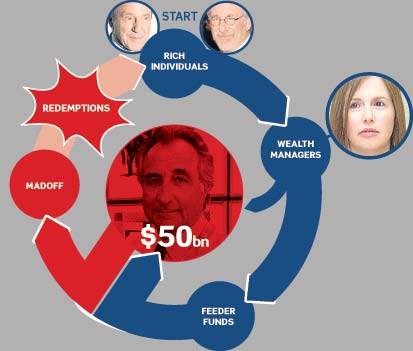
Those of us fleeced by Bernard Madoff are looking to get some of our money back from the government, which taxed us on money we never earned. In my case, I not only lost $5 million in the Ponzi scheme, but I paid almost $75,000 to the state of New Jersey and $275,000 to Uncle Sam in taxes over the past three years on income reported by me, which, as we all know now, never existed.
We Madoff investors, creditors, survivors—please call us anything other than victims—realize we will get back pennies on the dollar from Madoff if we’re lucky, but getting back the money we paid the government and which we’re entitled to apparently won’t be easy.
Madoff robbed me of $5 million and New Jersey now wants to rob me of $75,000.
Take New Jersey, for instance. On Feb. 20, the New Jersey Division of Taxation came forth with a “Ponzi Schemes and Amended Returns” notice on its website acknowledging that “many people with investments managed by Madoff are likely to have paid taxes on income that was never actually generated by them (phantom income).”
Rather than urge taxpayers to amend their tax returns to get a refund, the division does the exact opposite. “The Division of Taxation is not accepting amended returns with regard to the Bernard Madoff or other alleged Ponzi schemes,” the notice states. It goes on to advise taxpayers to claim a loss of investment that can be taken against capital gains in the year of the loss. Since almost nobody has a capital gain in 2008, the net effect of this notice is simple—Madoff robbed me of $5 million and New Jersey now wants to rob me of $75,000. The state might be reconsidering. On March 2, the notice was gone, replaced with: “The page you have requested cannot be displayed because it does not exist, has been moved, or”—and this is the part I like best—“the server has been instructed not to let you view it.” Things got even more interesting on March 3, when the reference to the notice disappeared entirely. The Madoff investors living in New Jersey have no clear instructions from the state, but come hell or high water, we will submit our amended returns. We are not asking for a bailout, just for our money back.
The federal government hasn’t given such mixed messages—it has given no guidance whatsoever. Although thousands of investors across the country are eagerly awaiting some pre-April 15 instruction, the IRS remains eerily silent. If transparency and communication are the linchpins of the new administration, the folks over at the IRS haven’t gotten the message.
This is a story seemingly without end. With this quick conviction…I’m sure the IRS would just like to forget about the whole thing.















#31, Cow-Patty,
#29. Ha! Then you agree that we shouldn’t pay taxes …
Yup, typical Cow-Patty response. When you disagree just pretend the other person said something you agree with and comment on that. I do think that counts as trolling.
Wall Street, “We make money the old fashion way” “We steal it”!!
No matter how it happens, I’d really enjoy watching New Jersey burn in hell.
# 34 Hmeyers said, “So, um, which is it?”
Obviously, it is both as the two are separate. As costs (taxes) go up, the costs get passed along as higher prices.
You REALLY couldn’t figure this out for yourself?
#38, it’s also very dependent on how elastic the demand is. The more elastic, the less the producer is able to raise his prices to offset an increase in taxes.
# 39 Sea Lawyer said, “#38, it’s also very dependent on how elastic the demand is. The more elastic, the less the producer is able to raise his prices to offset an increase in taxes.”
Yes, however, taxes aren’t. If a whole industry gets its taxes raised, the costs go somewhere, either companies raise prices or, offshore firms displace local companies. So, prices go up or jobs go. Either way, the “little guy” gets the shaft.
30 is right!
The fund had not collapsed at that time, so if you had pulled your money you would have been able to keep it. Proceeds from the money invested would be taken from another person participating in a ponzi scheme, but it still would have been real money.
Now people who stayed in might sue you to get some for themselves(happened with LTCM, I think).
If you take this type of thinking to its extreme how about people that invested in any of the other financial institutions? They were investing in companies which did not understand the nature of the risk that they were selling. In a way, their returns were also phantom. If people had been aware of the risks AIG took the stock might have been priced lower, no?
#41, Alphie,
It is theft to tax these people on money they never saw…that only Maddoff said existed…
The money existed. The (ahem) investors all wrote checks payable to Madoff. They could have withdrawn the money at any time. Instead they preferred to leave the money in the unregulated, uninsured fund.